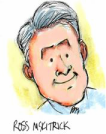The Friends of Science 11th annual luncheon was on May 13, 2014, featuring Dr. Ross McKitrick, at the Metropolitan Conference Centre, Calgary, Alberta.

Dr. Ross McKitrick is a Professor of Economics, University of Guelph, Ontario.
The title of Dr. Ross McKitrick talk is "The 'Pause' in Global Warming: Climate Policy Implications"
Climate models appear to overstate the effects of greenhouse gases. This presentation will explain the problem and show why it undermines the assumptions behind carbon dioxide emission policies
The presentation in PDF format is here.
Licia Corbella, columnist and the editorial page editor for the Calgary Herald, wrote an article about the luncheon presentation; print version here, PDF version here, Calgary Herald link here.
Dr. Ross McKitrick won the 2003 $10,000 Donner Prize for Best Book on Canadian Public Policy, for Taken By Storm: The Troubled Science Policy and Politics of Global Warming coauthored with Christopher Essex. He has written numerous articles on climate change, energy policy, environmental economics and pollution. He is a Senior Fellow of the Fraser Institute. See his website at www.rossmckitrick.com

Computer models of the climate system predicted that there should have been far more warming than was observed over the last 15 years, in response to rising atmospheric carbon dioxide levels. There is now increasing evidence that climate models have systematically exaggerated the actual effects of greenhouse gas emissions. This, in turn, has potentially major policy implications since model estimates of greenhouse gas effects drive estimates of the social costs of carbon and the perceived urgency of reducing emissions. This presentation will provide a non-technical overview of the growing divergence between climate models and reality, and explain why it will likely soon force a deep re-think of the basic assumptions on which global climate policy is based. Policy makers and stakeholders need to be aware of these developments to avoid making long term plans based on assumptions that look increasingly unlikely to be true.
